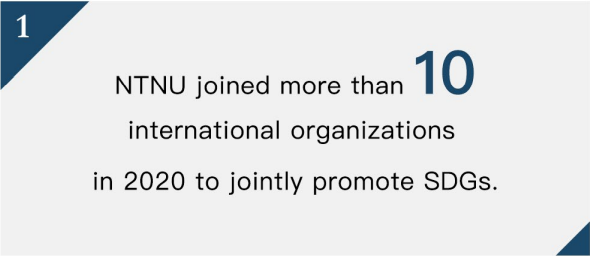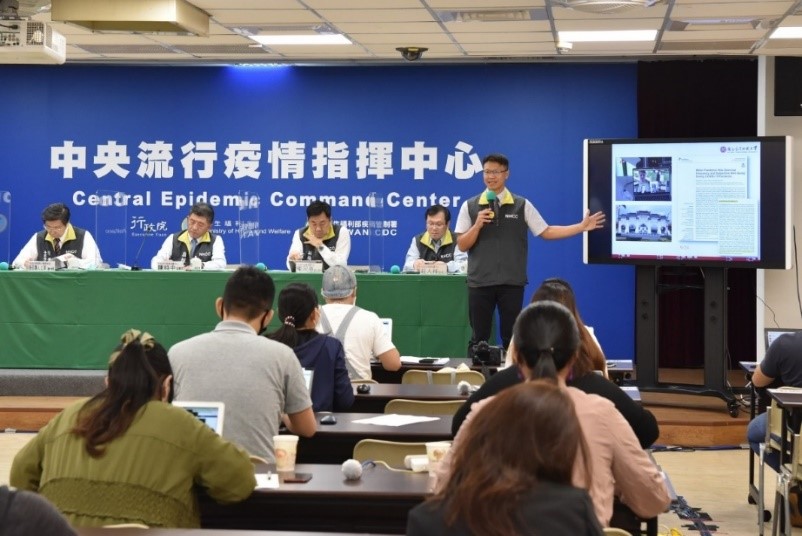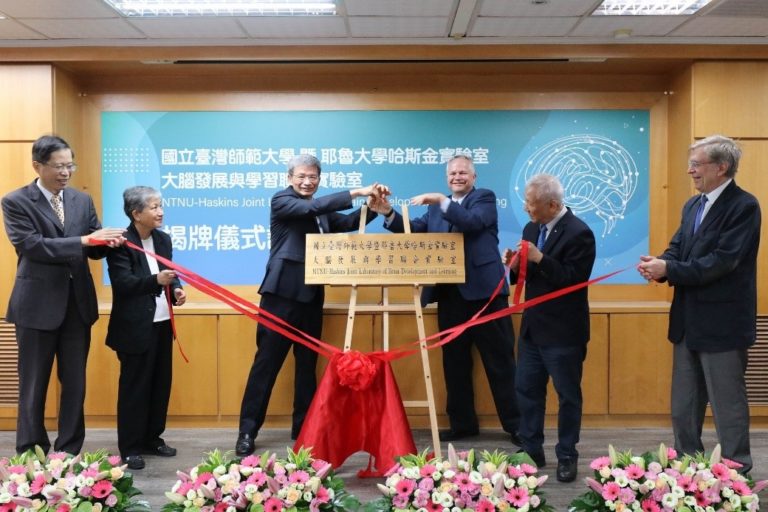


17.1 Spirit of the SDG and the University’s Philosophy
SDG 17 is aimed at consolidating change through fundraising, technological exchanges, increasing interactions between countries, lowering the barriers to foreign trade of developing countries, achieving consistency in national foreign and domestic policies, and supporting disadvantaged countries. The University has fulfilled its USR. In terms of overall institutional governance, the University links relevant stakeholders including students, graduate alumni, teachers, researchers, and administrative teams to jointly promote institution activities based on the concept of sustainable development, governance, and development. At the community level, the University cares about the welfare of different communities such as the elders, the people who usually do exercises on campus, and the people who work in the night market around the university. NTNU has built a partnership of coexistence and coprosperity, and promote positive development with different communities. At the national level, NTNU has established a professional think tank for SDGs, provided policy development and professional consulting services, and formed partnerships with government departments to jointly promote SDGs. On the international front, teachers and students are encouraged to participate in sustainable-development-related international organizations and conferences, share the unique achievements of the University, and jointly perform the tasks required to achieve sustainable development.
17.2 Achievements
Promoting a green university and signing the Talloires Declaration
NTNU promotes energy-saving and carbon-reduction plans, and strives to create a sustainable campus that integrates the arts, humanities, and ecology. It is hoped that more universities will sign the Talloires Declaration, and work together to transform university campuses. This declaration is currently the most important document that internationally recognized universities use to promote sustainable development. In 2014, 25 colleges and universities from all over Taiwan gathered at NTNU to jointly sign the Talloires Declaration, declaring the implementation of the Earth’s environmental protection and sustainable operation of the campus. In cooperation with the Global Environmental Education Partnership, NTNU hosted the first bilateral climate education workshop between Taiwan and the United States to share experiences in sustainable-development education. The University participated in the Taiwan Green University Alliance and formed a partnership to jointly promote this SDG.
Assisting the Ministry of Education of Taiwan to improve the education standards of rural high schools
Taiwan’s Ministry of Education’s “High School Quality Auxiliary Program” has a policy goal of developing high-quality high schools in various regions, including so that all students can enroll in their nearest schools without being disadvantaged. NTNU has served as the chief host of the project since 2007. In 2020, the University assisted 249 schools in promoting the new curriculum and providing professional support systems, and supported more than 100 workshops to improve teachers’ professional knowledge and assist in the development and implementation of the 12-year national basic education curriculum.
Assisting the Ministry of Education of Taiwan to support disadvantaged and low-achieving students, and level the gaps in learning achievement
NTNU has established a complete teaching support system to help rural schools improve their teaching effectiveness. To date this system has assisted 50 schools, and provided 122 training sessions to teachers, 61,251 student learning diagnostic services, and 893 classes serving 6,680 students. The university provides regular written reports on practical experiences in order to establish a long-term academic-ability database as a reference that the Ministry of Education can use to formulate rural policies.
Cooperating with NGOs to achieve SDGs
In terms of environmental conservation, members of the NTNU Institute of Environmental Education joined the Society of Wetland Scientists in 2012. They have jointly promoted international wetland conservation and participated in wetland research and international cooperation projects. In terms of the green energy industry, a training center meeting the original factory specifications was established in cooperation with the Smart Transportation and Energy Industry Association, and the Gogoro Electric Locomotive Repair Talent Certified Trainer Class was established to cultivate relevant services and maintenance technology talent. More than 30 students were assisted in obtaining their original factory certifications. In terms of human rights, in 2019 NTNU started to cooperate with the Chinese Olympic Committee to organize the International Women and Sports Seminar to achieve gender equality and empower women, while in 2020 the University assisted in signing the “Women and Sports Declaration” with individual sports associations.
17.3 Featured Highlights
17.3.1Joining international organizations to fight the COVID-19 epidemic
The research team of the Department of Physical Education and Exercise Science participated in the International Research Group on COVID-19 and exercise initiated by the University of Potsdam in Germany across 99 countries in 2020 to explore changes in sports behavior and mood during the COVID-19 epidemic. The research results have been published in the International Journal of Environmental Research and Public Health. The research team conducted discussions on Taiwan in 2020, providing current and future responses to fitness exercises and mental health, and was invited to report at the press conference of the Central Epidemic Command Center. The International Society of Sport Psychology participated in discussions on the negative impacts of the novel coronavirus on mental health. In 2020, an editorial was published in the International Journal of Sports and Fitness Psychology, calling on countries around the world to take countermeasures against the COVID-19 epidemic and explaining the key role of exercise in supporting mental health.

Related Media Coverage
17.3.2 Showing a globalized vision and approach in implementing SDGs
NTNU and the Haskin Laboratories of Yale University in the United States together established the “NTNU-Haskins Joint Laboratory of Brain Development and Learning” in 2019. Making use of a functional near-infrared spectroscopy instrument, the laboratory conducts interventional research on infant language and reading development, as well as collecting cross-language data for analysis and comparisons. The laboratory is also used as the Connection Hub and Data Analysis and Integration Station to promote reading competencies in Asia-Pacific countries.

Related Media Coverage
17.3.3 Promoting USR, the results are widely recognized by all walks of life
NTNU established the Sustainable Development Committee and the Sustainable Development Center, and together with multiple academic and administrative units in the University established an institution-wide sustainable governance mechanism to guide students to care for society and the environment, achieve the SDGs, and promote social connections. The Commonwealth Magazine conducted a “Universal USR University Citizen” survey in 2020, which is also the only USR survey performed in Taiwan. The survey results ranked NTNU as the fourth general large-scale public university. Through its strong support for providing education to disadvantaged students’ education in rural areas, creating a friendly community for the elderly, and reducing plastic events, the University leads college students into this field of work and provides them with in-depth support. Utilizing local practices allows the general public to witness the University’s focus on connecting with the locality and solving local needs. In 2020, NTNU was widely recognized by receiving the “Taiwan Enterprise Sustainability Award,” the “University USR Sustainability Program Award,” a silver award for the “Deep Plowing and Rural Education” project, and a bronze award for the “Building an All-Round System for the Elderly’s Health – Creating a Friendly Community for the Elderly” project.

